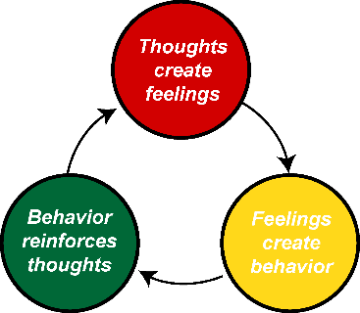Background
Cognitive Behavioral Therapy (CBT) operates on the principle that our thoughts, feelings, and behaviors are interconnected, and that changing one can lead to changes in the others. Let's use an example to illustrate this concept with three different individuals experiencing different feelings about the same event: receiving criticism from their boss at work.
Person A - Anxiety:
- Event : Person A receives constructive criticism from their boss about a recent project.
- Thought : Person A's thought might be, "I'm such a failure. My boss is disappointed in me".
- Feeling : This thought triggers feelings of anxiety and inadequacy.
- Behavior : As a result, Person A might avoid taking on new projects or start overworking themselves to prove their worth to their boss.
Person B - Anger:
- Event : Person B receives the same constructive criticism from their boss.
- Thought : Person B's thought might be, "My boss doesn't appreciate my hard work. They're always picking on me".
- Feeling : This thought triggers feelings of anger and resentment towards their boss.
- Behavior : Person B might become defensive during meetings or even confrontational with their boss, leading to potential conflict in the workplace.
Person C - Motivation:
- Event : Person C also receives the same criticism.
- Thought : Person C's thought might be, "Okay, there are areas where I can improve. This feedback will help me grow and do better next time".
- Feeling : This thought triggers feelings of determination and motivation.
- Behavior : Person C might proactively seek guidance from their boss or colleagues, or they may invest extra effort in refining their skills and approaches to ensure better performance in the future.
In each case, the event remains the same, but the thoughts that individuals attach to it lead to different emotional responses and subsequently influence their behaviors. In CBT, the aim is to identify and challenge negative or unhelpful thought patterns and replace them with more realistic and constructive ones, thereby altering the associated feelings and behaviors for the better.
In cognitive behavioral therapy, automatic thoughts (or casual limiting beliefs or casual negative beliefs) are involuntary, and often unconscious stream of thoughts that run through your mind. Many of them are not consciously perceived and yet still influence how you feel and how you behave. Much of the these feelings is caused by unhelpful (and untrue!) casual thoughts.
The goal of this exercise is to articulate these thoughts that have previously been under the radar and put them to the test. We will challenge them with 8 questions to identify the problems of the negative casual thought and see how much of the thought is true.
instructions
- Identify and articulate the negative thought
- The first two questions analyze the evidence for and against this thought. We want to be objective here. Only evidence that would hold up in a court of law is accepted.
- The second two questions consider an outside perspective, what advice would you give to a friend who had this idea and what advice would your calmest, most rational friend give to you if you told them about his thought.
- The 5th question asks if you are considering something that is outside of your control? Often we can not control the behavior of others, or what people think, or the results of all our endevors.
- The 6th question considers you to weigh the pros and cons of having this thought. How does it help you and how does it hurt you.
- The 7th question asks what would you gain if you gave up the thought?
- The final question considers the worst case scenario…if the thought were true what is the worst outcome, often it is not as bad as we think.








